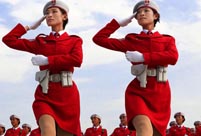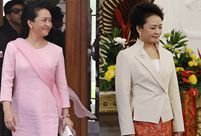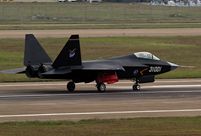 Bikini show in 2014 China Final of Miss Tourism World
Bikini show in 2014 China Final of Miss Tourism World
 Close-up view of August Aerobatic Team
Close-up view of August Aerobatic Team
 Goddesses married in 2014
Goddesses married in 2014
 Polar region photos raise worldwide awareness of global warming
Polar region photos raise worldwide awareness of global warming
 Get off at the last stop — Beijing Subway in vision
Get off at the last stop — Beijing Subway in vision
 Top 100 beauties in the world!
Top 100 beauties in the world!
 Gallery: Who is the most beautiful one?
Gallery: Who is the most beautiful one?
 If you like autumn, put your hands in the air!
If you like autumn, put your hands in the air!
 Fan Bingbing's "Queen style" in new play
Fan Bingbing's "Queen style" in new play
 Lingerie show at 2014 Miss China
Lingerie show at 2014 Miss China
TOKYO, Dec. 13 -- Denying the Nanjing Massacre violates Japan's post-war commitment, tramples the dignity of the victims and hurts their families' feelings, according to Motokazu Nogawa, a lecturer of Nihon University.
Nogawa, a researcher on historical revisionism issue of Japanese right-wing forces, said Japanese nationalist right-wing groups always deny the Nanjing Massacre, citing Nagoya mayor Takashi Kawamura who claimed that the Nanjing Massacre was entirely fabricated.
"In fact, their real purpose is to get dominance in the political field rather than the academic field," Nogawa said in an exclusive interview with Xinhua on the eve of China's first National Memorial Day for Nanjing Massacre Victims on Dec. 13, which also marks the 77th anniversary of the mass-slaughter.
On Dec. 13, 1937, Japanese troops captured the then Chinese capital Nanjing, killing some 300,000 unarmed people within six weeks.
According to Nogawa, Japanese right wingers use all kinds of communication tools to deny the Nanjing Massacre. On the contrary, few impartial stories about the massacre could be heard from Japanese media. "This kind of imbalance makes it difficult for the public to have access to historical facts," he said.
"The Nanjing Massacre trampled the victims' dignity and hurt their families' feelings deeply. However, a majority of media organizations focus on interpretation that the incident is simply 'a block against Sino-Japanese relations' or 'a controversial topic between right and left wing forces'."
"Meanwhile, some intellectuals in Japan know the historical facts, but choose to keep silent. Most of them have a good knowledge about Western countries' firm attitude toward the massacre of the Jewish population, when it comes to the Nanjing Massacre, however, they are excessively tight-lipped," Nogawa said.
The International Military Tribunal for the Far East, established for war crimes and other wartime atrocities after World War II, ruled the Nanjing Massacre was among war crimes.
To Nogawa, recognizing the verdict constitutes the premise of Japan's return to the international community in the post-war era and the signing of the China-Japan Joint Statement.
In the statement signed in 1972, the Japanese government expressed its "deep introspection" on Japan's responsibility for the enormous losses sustained by the Chinese people as the result of the war and expressed its stance to strictly follow the " Potsdam Proclamation".
So, Nogawa said, on China's side, denying the Nanjing Massacre not only means denial of Japan's war crimes, but also goes against Japan's commitment to the international community.
He also suggested that the Chinese side emphasize to Japanese citizens "Japan's recognition of the Nanjing Massacre is a symbol of reconciliation in bilateral relations."
Regional prosperity cannot be achieved without peaceful co- existence and full awareness of the past, Nogawa said, adding "I hope nationals of the two countries to remember those Chinese people who have suffered from the war and honor the victims of the massacre."
 20 years on: Relocated Three Gorges residents through lens
20 years on: Relocated Three Gorges residents through lens PLA HK Garrison veterans leave behind beautiful smiles
PLA HK Garrison veterans leave behind beautiful smiles Representative beauties of each province in China
Representative beauties of each province in China Chestnut girl goes viral online
Chestnut girl goes viral online Victoria's Secret Fashion Show
Victoria's Secret Fashion Show In photos: Bright and brave female soldier of PLA
In photos: Bright and brave female soldier of PLA China's charming first lady
China's charming first lady Excellent photos of Zhuhai Air Show
Excellent photos of Zhuhai Air Show China's heavyweight aircraft
China's heavyweight aircraft Society needs consensus on street politics
Society needs consensus on street politics Policy bank plan gets mixed reaction
Policy bank plan gets mixed reaction  Shopaholics
Shopaholics  Hungry moments
Hungry momentsDay|Week|Month